

Flower Power. Make love, not war.
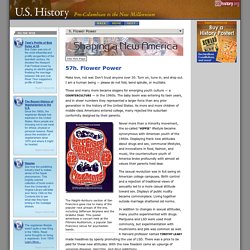
Don't trust anyone over 30. Turn on, tune in, and drop out. I am a human being — please do not fold, bend spindle, or mutilate. These and many more became slogans for emerging youth culture — a counterculture — in the 1960s. The baby boom was entering its teen years, and in sheer numbers they represented a larger force than any prior generation in the history of the United States. Flower Power. When did the Hippie Era End? - Thank a Hippie. It could be said that the mass counterculture movement ended in the time period 1970-1973 due to various factors. 1.
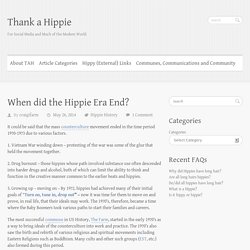
5 Reasons Why the Hippie Movement Declined. Achieving a higher form of consciousness via drugs was a central tenet of the hippie movement.
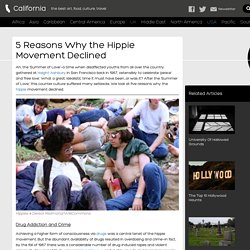
The History of Rave & Hardcore Cyber Rave Wear Fashion. Some of these were practical, some enhanced the effects of ecstasy some shone under UV & laser light.

Many of these items are still with us today. Bum bags have fallen by the way side and dummies are generally not used, whistles are less in evidence but still there. Boiler suits, white gloves are still in abundance and have been joined by a more complicated outfit of cyber club wear with fluffy leg and arm warmers. This is an emerged youth culture that refuses to go away after over 15 years in existence. Ukpga 1994 33 contents. Birth control pills helped empower women, changed the world. Copley News Service, July 17, 2005 Birth control pills helped empower women, changed the world Author : Sandy Cohen.
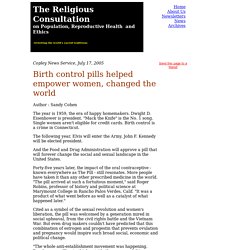
The Pill: A Sexual Revolution? As the pill began to be used for contraceptive purposes, much debate arose about whether or not the approval of the pill directly caused a sexual revolution.
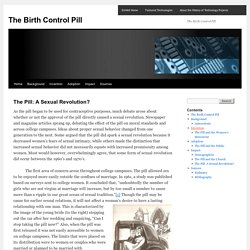
Newspaper and magazine articles sprang up, debating the effect of the pill on moral standards and across college campuses. Ideas about proper sexual behavior changed from one generation to the next. Some argued that the pill did spark a sexual revolution because it decreased women’s fears of sexual intimacy, while others made the distinction that increased sexual behavior did not necessarily equate with increased promiscuity among women. Most would however, overwhelmingly agree, that some form of sexual revolution did occur between the 1960’s and 1970’s. The first area of concern arose throughout college campuses. Have a lasting relationship with one man. Hippies and Drugs - Hippies From A to Z by Skip Stone.
Hippies from A to Zby Skip Stone Hippies & Drugs "But I would not feel so all alone, everybody must get stoned.
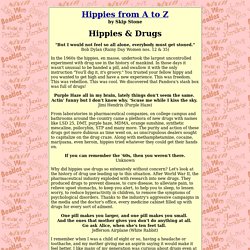
"Bob Dylan (Rainy Day Women nos. 12 & 35) The Hippie Counter Culture Movement (1960’s) The 1960’s are defined by the hippie counter-culture craze that invaded the lives of every citizen in the United States and around the world.
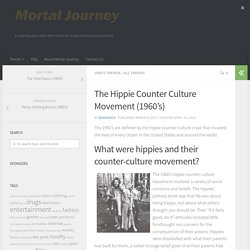
The 1960’s hippie counter culture movement involved a variety of social concerns and beliefs. The hippies’ primary tenet was that life was about being happy, not about what others thought you should be. Their “if it feels good, do it” attitudes included little forethought nor concern for the consequences of their actions. Hippies were dissatisfied with what their parents had built for them, a rather strange belief given that their parents had built the greatest booming economy the world had ever seen. Hippies rejected established institutions. Hippies rejected middle class values, opposed nuclear weapons and the Vietnam War.
Hippies were often vegetarian and believed in eco friendly environmental practices. Acid house and the dawn of a rave new world. Several years ago, for the 20th anniversary of acid house and Britain's "second summer of love", I interviewed some of the main players of those early days for the Observer Music Monthly magazine.

It was a brief oral history, weaving together snippets from the main DJs, promoters and original ravers. "No one's really told the story of acid house like this," Haçienda DJ Mike Pickering told me. When the 25th anniversary came around, it felt like the right time to speak to those people and others to pull together all their stories, many of which had never been told, for a book. I interviewed more than 80 people, from DJs such as Sasha, Paul Oakenfold and Andrew Weatherall, musicians such as Boy George and 808 State, to promoters, ravers, dealers and police. Everyone had a slightly different take on proceedings, depending on where their initiation came. "It's the closest thing to mass organised zombie-dom," frowned BBC Radio 1 DJ Peter Powell, when acid house first arrived.
Everything Starts With an E - History of Rave. January - Steve 'Silk' Hurley has the first House number 1 with "Jack your Body" The Times newspaper reports the first ecstacy seizures in London.
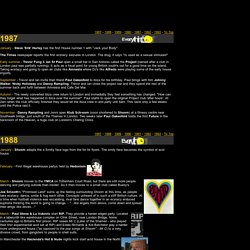
The drug, it says "Is used as a sexual stimulant" Early summer - Trevor Fung & Ian St Paul open a small bar in San Antonio called the Project (named after a club in London paul was partially running). The party's over: how the 1980s rave generation grew up. I only did it for a few years and don’t regret it, but I’m glad I moved on.